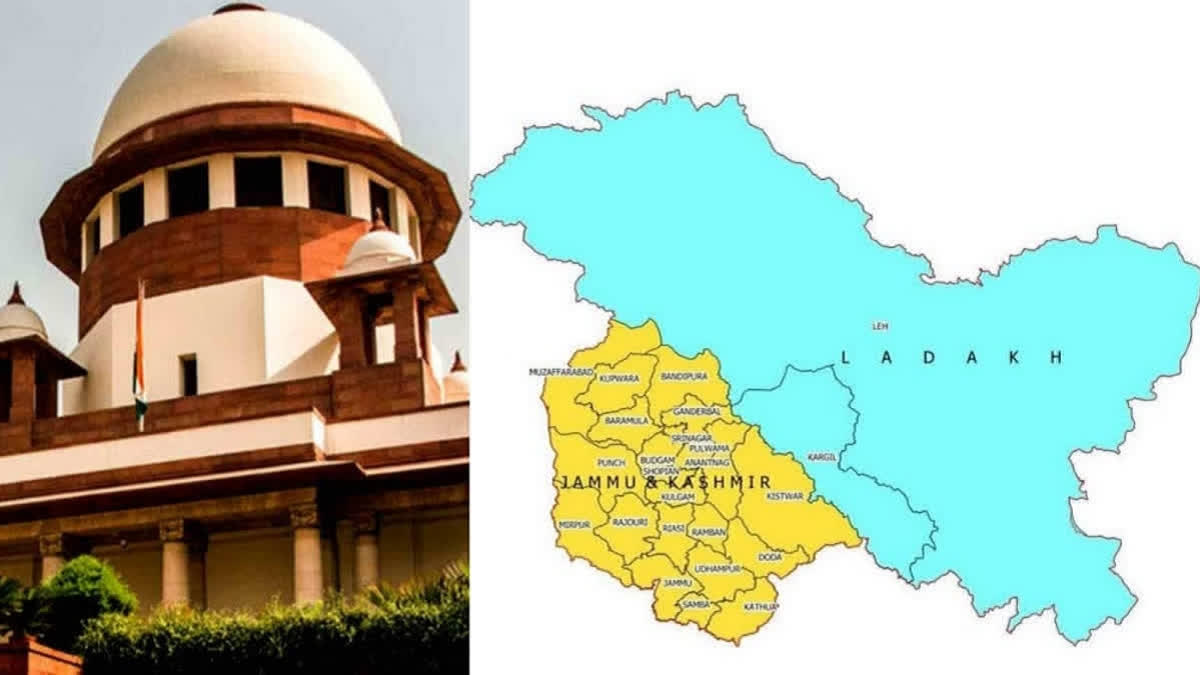New Delhi:The Supreme Court on Thursday orally remarked that "the means have to be consistent with the ends" as Attorney General R Venkataramani opened the arguments defending the Centre’s decision to abrogate Article 370.
“We cannot postulate a scenario where ends justify the means....the means have to be consistent with the ends," said Chief Justice of India D Y Chandrachud who heads the five-judge constitution bench also comprising justices S K Kaul, Sanjiv Khanna, B R Gavai, and Surya Kant that is hearing a batch of pleas challenging the abrogation of Article 370 in 2019, which bestowed special status on the erstwhile state of Jammu and Kashmir.
The Attorney General, representing the Centre, began the Centre’s response by submitting that "it is often the case that a limb is amputated to save a life but life is not given to save a limb" and that they wanted to ensure that the Constitution "is preserved with regard to processes and due process and on the other hand there was a scenario of losing the nation".
At this juncture, the Chief Justice said, “Mr Attorney General, we cannot postulate a situation where the ends justify the means also…means have to be consistent with the end”. The AG replied: All of us understand that and this question confronts us in both public and personal life. He contended that J&K had "lost all traces of sovereignty, after it signed the Instrument of Accession (IoA) with the Indian government in October 1947". Venkataramani said border states like J&K form a special class of territories of India and their reorganisation required special consideration.
The Chief Justice pointed to the Centre’s counsel that a combination of Sardar Vallabhai Patel’s genius and persuasion brought 562 princely states to the Union of India, but Jammu and Kashmir followed the route of Article 370. The Chief Justice pointed to Solicitor General Tushar Mehta, also representing the Centre, that the crux of petitioners' arguments is that J&K gave up external sovereignty, and there is no doubt about it, but not internal sovereignty.
The Chief Justice added that they say the adoption of Article 370 would indicate that while there was a giving up of external sovereignty, internal sovereignty exercised by the then Maharaja, was not ceded to India. Both Venkataramani and Mehta vehemently argued before the apex court that the abrogation was not a “fraud on the Constitution”.
Mehta said petitioners are confusing internal sovereignty with autonomy and stressed that autonomy of states already exists and accession was the first step towards losing one’s sovereignty. Mehta contended that "external sovereignty lies with the Union of India" and "internal sovereignty would mean the autonomy of federal units, and this autonomy is there with every state".
The top court pointed out that the Indian Constitution did not devise a provision like Article 370 for the other princely states, who accepted the ultimate dominion power and legislative authority of the Union of India. Mehta said the contention that Jammu and Kashmir was the only princely state with its own constitution is factually incorrect and emphasized that 62 states had framed their own constitution and 286 across the length and breadth of the country were in the process of framing their own constitutions.
Mehta said merely because in 1939 J&K had a Constitution or the IoA had mentioned certain reservations interpreted as a continuation of the state’s internal sovereignty, J&K cannot be considered unique. He said the draft of the IoA was common to all the princely states and it is not correct to say that Article 370 was a special feature and it was a privilege given to J&K which could never be taken away.
Mehta said due to confusion on whether Article 370 was temporary or permanent, there was a psychological duality in the mind of a particular section of our country. He stressed that this confusion was taken advantage of by forces inimical to India and with the abrogation of Article 370 this duality has ended.
Mehta said the 42nd and 44th amendments to the Indian Constitution introduced the terms ‘socialist’ and ‘secular’ to the Preamble. He queried that it was not made applicable till August 5, 2019, and the J&K constitution was neither socialist nor secular. The top court asked Mehta for a list of states that joined the Union of India without a merger agreement and yet became a part of the Union. Mehta will continue to make submissions on the matter on Monday.
